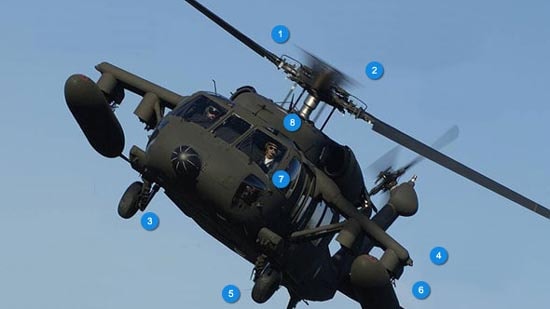Has America's cutting-edge weapons technology "fallen into China's hands"?
The US Department of Defense confirmed that the designs of more than 20 major weapons systems of the US military were stolen by hackers.
Specifically, a recent secret report by the Defense Science Board said that the designs of the Pentagon's most modern weapons, including the Black Hawk helicopter and the Navy's Littoral Combat Ship (LCS), were "stolen." The culprit is believed to be Chinese.
The Washington Post also admitted late on May 27 that it had seen a copy of the report and confirmed that the Chinese now have the "formula" needed to "copy" some of America's most sophisticated weapons programs.
“China has thus gained a multibillion-dollar combat advantage,” an unnamed defense official told Washington Post reporters. “They have saved themselves 25 years of research and development.”
“The situation is dire,” he said of the report.
 |
(photo: sikorsky) |
The Defense Science Board, a civilian advisory panel within the Pentagon, has decided not to accuse China of stealing the blueprints. However, the Washington Post article appeared shortly afterThe US Department of Defense recently made official accusations against the perpetrators of cyber attacks..
In a previous report, the Pentagon asserted that “in 2012, numerous global computer networks, including those of the U.S. government, continued to be targeted for intrusions, including those that appear to be directly attributable to the Chinese government and military.”
Ellen Nakashima, a Washington Post reporter who detailed the Defense Science Board's analysis, wrote that the computer systems at the Pentagon's headquarters may not have been compromised, but the defense contractors who built the weapons systems likely had their information security compromised.
According to the reporter, anonymous US officials said a closed-door meeting in 2012 ended with evidence that major contractors for the US military had suffered information breaches. When contacted and asked for comment, all major contractors such as Boeing, Lockheed Martin, Raytheon and Northrop Grumman declined.
Chinese hackers have previously been accused of launching cyberattacks on a number of US entities, including multi-billion dollar corporations and US government departments. In 2007, it was reported that China had “obtained” blueprints for the US F-35 fighter jet – the most expensive weapons program to date – but the latest report from the Defence Science Board suggests the scope of the breach is much larger.
According to the Washington Post, plans for the Patriot missile system, an Army anti-ballistic program, and a number of aircraft ended up in Chinese hands. This means that China is trying to recreate what has become a symbol of American military power to develop its own offensive capabilities. Not only that, this also puts China in a position to dominate the enemy's advanced weapons systems because it "knows" the internal structure and outlines a plan to prevent it.
“Once they get into the missile system and understand its basic algorithms, they will be able to understand how it works and then jam or disable it,” Winslow T. Wheeler, director of the Straus Military Reform Project, told the Washington Post.
Mandiant, an American security company based outside Washington, released a sensational report in early 2013 that China had used a team of cyber warriors to hack into American computer systems and wage espionage as the People's Liberation Army.
When the report was published in February 2013, Mandiant said that the mysterious Unit 61398 had successfully hacked more than 141 companies in 20 industries, including Coca-Cola and a Canadian service company. Those hacks “‘declined’ after Mandiant “name” perpetrator, but earlier this May, Mandiant said such attacks had resumed.
For its part, China has consistently denied all allegations that it launched cyber attacks against US computer networks. After Mandiant’s initial report, a Chinese Foreign Ministry spokesman called the accusations “irresponsible and unprofessional.”
At that time, Mr. Hong Lei said that “cyber attacks are transnational and anonymous,” and then asserted: “It is extremely difficult to determine the origin of the attacks. We do not see any reasonableness in the evidence presented by the so-called report.”/.
According to VOV - DT






